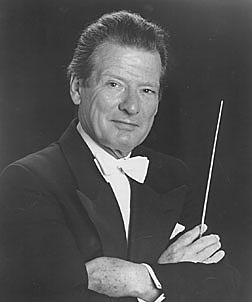Sir Neville Marriner: Beyond the Academy by Anthony Kirby
/ June 1, 2000
Version française...

Best known as the founder and artistic director of the Academy
of St. Martin-in-the-Fields, Marriner is also very much in demand
with orchestras around the world. He recently completed a three-year
contract with the Opéra de Lyon, conducting Mozart's Cosě
Fan Tutte.
Marriner feels that Mozart is perhaps the greatest composer
to date "because of the sheer volume of his work. Mozart
has written opera, symphony, sacred and chamber music - not to
mention his piano and violin concerti."
Honoured by the Austrian Music Academy with two Gemeinde Awards
for the excellence of his Mozart recordings, Marriner is also
remembered for his musical direction of the Milos Foreman films
Amadeus and Valmont. "What Amadeus had,"
he recalls, "was an excellent scenario by Peter Shaffer with
a strong conflict. The play, however, had only six minutes of
music. In the film we featured an hour and a half."
After wartime service in the armed forces, Marriner began building
a reputation as a chamber violinist in the Martin String Quartet,
the Jacobean Ensemble and the London Mozart Players. He held these
positions in addition to playing with the London Symphony Orchestra
for 13 years.
He has mixed feelings about this period and says, "I think
we were all frustrated with our daily routine. Forty-five years
ago London orchestras were not as good as they are now and the
L.S.O. was probably the worst. It was half way through the Joseph
Krips era; he smoothed over the cracks so you didn't hear too
much of what was going on. There was a lack of responsibility.
I led the second violins but there was little you could do to
influence the sound. So I think we got together as the Academy
to give ourselves that sort of responsibility and to play well.
One thing we were looking for from the start was players who really
fit together, who sounded in tune."
The owner of the then newly founded L'Oiseau Lyere record label
came to their first concert in the Church of St. Martin-in-the-Fields.
He signed the new ensemble on the spot. "We immediately recorded
all those Italian ice-cream merchants - Manfredini, Corelli, and
so on," Marriner recalls. "So in one leap we had gone
from being a friendly society to something almost professional."
"What the Academy has now, after more than 40 years, is
a core group of 15 musicians under concert-mistress Iona Brown.
To these we add extra instrumentalists to correspond to the size
of the hall and to the repertoire. Initially we performed in halls
with capacities of 1,000. Now we frequently play in concert halls
of 2,500 seats, so we add extra string and wind instruments to
balance the sound. If we perform the romantic repertoire we need
more musicians. Most Beethoven symphonies require 80 or more instruments,
and the late romantics even more."
Sir Neville's way of selecting players for the Academy remains
constant. First comes the audition. "You can tell within
five minutes what they can do." Then they are put into the
Academy for a few concerts to see how quickly they absorb its
ensemble style. "But the most important test," says
Marriner, "is to take them on tour and see if you can bear
to spend time with them. If they are miserable devils, they don't
get invited back."
The Academy has always been unsubsidized. "If the (British)
Arts Council give you money, they also tell you how to spend it.
We don't want other people poking into our artistic pie. Of course,
the result is that the orchestra is always on a knife-edge, financially."
Paradoxically this quintessentially British orchestra has no London
season. They perform regularly in various European countries where
ticket prices are high. "We once sold out the Royal Festival
Hall and lost $64,000 in a single night," says Marriner.
"Music is a continuum," he says, "and the modern
and avant-garde composers of today will be part of the standard
repertoire 30 years from now."
Marriner remarks that, having "decided two or three years
ago that I wasn't immortal, I'm trying to delegate some of my
responsibilities with the Academy to Iona Brown and others."
However, he wants his orchestra to continue "as a regenerative
institution. I would like new people with new ideas to come into
it and change it. But that's more a question of repertoire and
so on, rather than playing style. Taste is changing, style is
changing, and players' abilities are changing."
But what of his work with orchestras throughout the world?
"Like (Sir George) Solti, I will probably go on until I'm
stopped," he says wryly. "The awful thing about a conductor
becoming geriatric is that you seem to become more desirable,
not less. I just wish all these offers had come in when I was
30!"
Version française... | 

